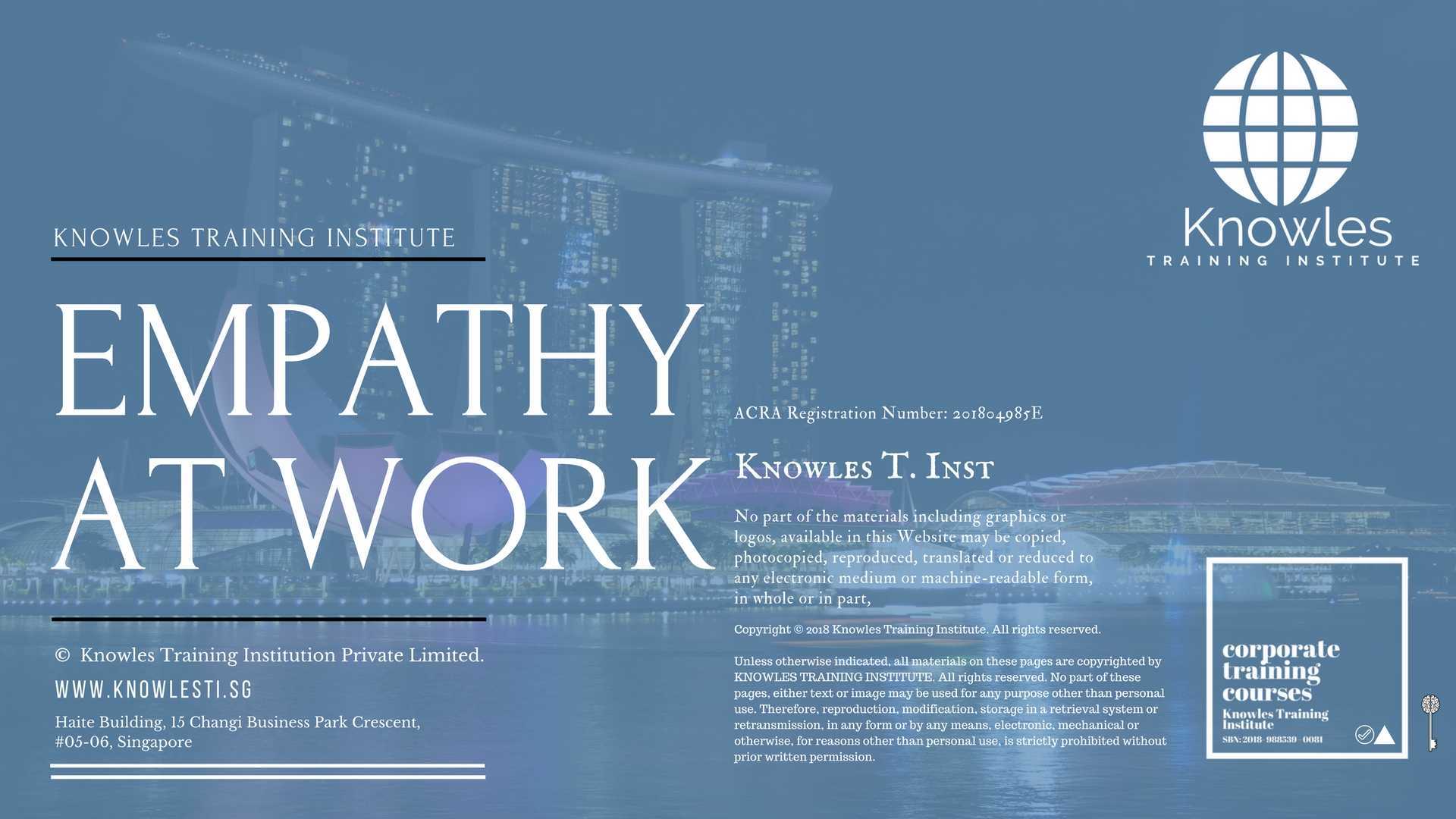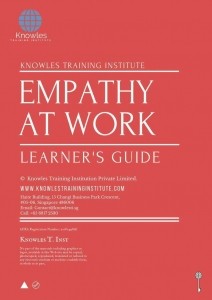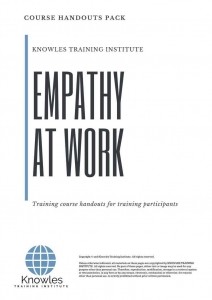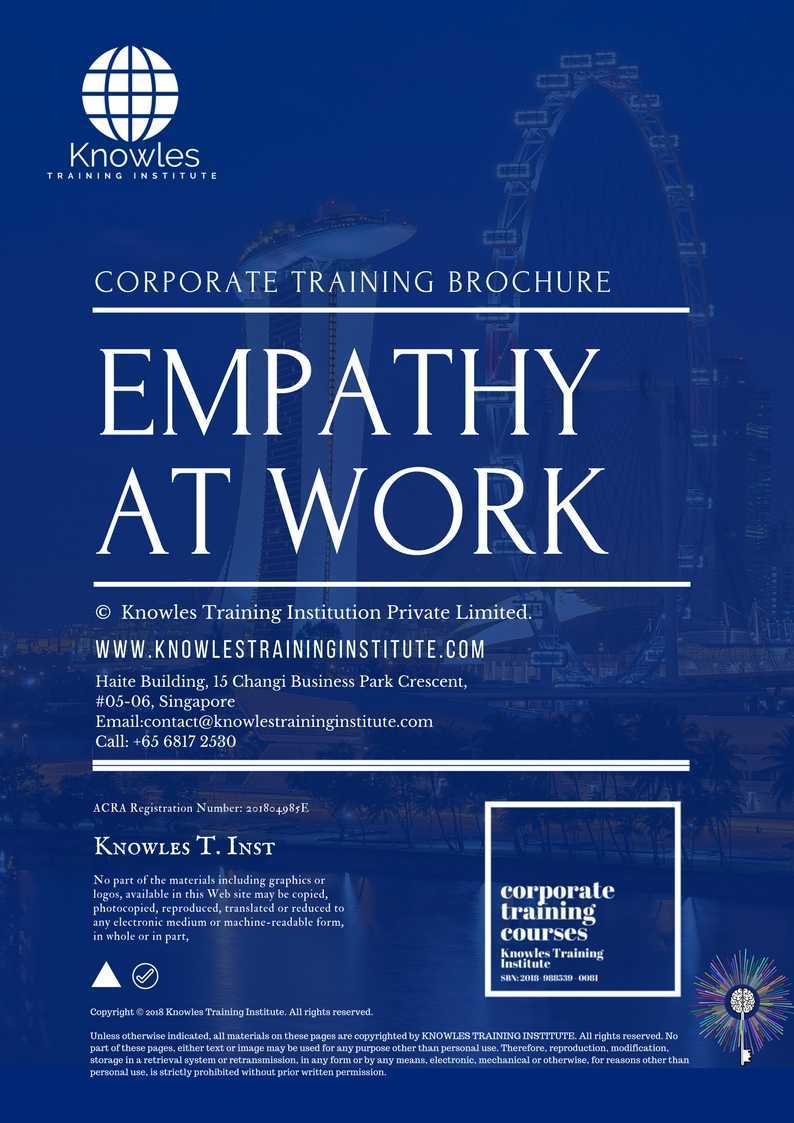Empathy At Work Training Course in Norway
Our corporate training course is also available in Oslo, Bergen, Stavanger, Trondheim, Drammen, Fredrikstad, Kristiansand, Sandnes, Tromsø, Sarpsborg, Skien, Ålesund, Sandefjord, Haugesund, Tønsberg, Moss, Porsgrunn, Bodø, Arendal, Hamar, Ytrebygda, Larvik, Halden, Lillehammer, Mo i Rana, Molde, Horten, Gjøvik, Askøy, Kristiansund, Flåm, Geiranger, Svolvær, and Kirkenes.

About This Empathy At Work Training Course in Norway
Empathy at Work Training Course in Norway
Empathy is an emotional capability to relate to a person’s feelings. It is often analogized as “walking on someone’s shoes.” In the workplace, empathy for others enhances a strong, tight-knit relationship that can overcome emotional stresses together. Learning to be empathic helps an individual to avoid offending someone and jumping to the wrong conclusions.
Empathy is the capacity to as it should be placed yourself in other person’s situation to apprehend the alternative’s scenario, perceptions and feelings from their point of view and as a way to talk that understanding back to the other person. Empathy is a crucial talent with a purpose to have as a frontrunner. Empathy is from time to time careworn with sympathy. Sympathy involves simply being stricken by the other character’s perceptions, reviews and feelings. for instance, if an employee is frustrated and sad, the sympathetic leader could revel in the same emotions, resulting in the chief oftentimes suffering from identical problems as the employee. hence, sympathy can actually get inside the way of effective main.
Empathy contributes to a correct knowledge of your employees, their perceptions and issues. It additionally complements your communique capabilities due to the fact you could sense what others need to understand and if they are getting it from you or not. ideally, your personnel can analyze skills in empathy from you, thereby supporting them to become greater effective leaders, managers and supervisors themselves.
The 3 styles of Empathy You need to strengthen are Cognitive Empathy, Social Empathy, Empathic concern.
growing empathy is the primary of five steps in traditional layout questioning, and it is what underpins the using ethos of human-focused design. Empathy supports engagement, retention, commerce, lengthy client relationships or even correlates to accelerated sales.
Empathy isn’t only a soft skill, but it’s also a talent that situations might do nicely with. this could be executed in special approaches, for instance by using training leaders on how empathy can help them emerge as greater efficiency through paying attention to the human beings that they manipulate, by respecting their opinions even if you disagree with them, and by using showing that you care approximately them as humans. There are also small steps that each folk can take to carry extra empathy to our existence; to momentarily silence our critiques, to try and see others factors of view, and to take some time to genuinely pay attention to the views of them. This technique takes time, that is a precious commodity in the current instances, in which we’re being asked to do greater with less. however, empathy funding will bring about extra engaged effects, and in the long run, fulfilment.
After taking this course you’ll have the ability to better connect to yourself, and also the self-consciousness that allows you to explicit yourself without muddying your message with the violence and judgement which might be this type of natural a part of our language.
Can You Teach Empathy?
Lasting empathy can’t be taught overnight, but the foundations of empathetic skills can be immediately visible through encouragements and instructions. In a study published in the Journal of Personality and Social Psychology, researchers succeeded in applying empathy in situations involving racism. Their participants were shown a video of a black man experiencing discrimination while going through regular public interactions.
After being asked to imagine the black man’s feelings and their own if it happened to them, the tests later showed less bias. Empathy training is also one of the most effective ways to teach empathy. According to a Forbes article, customer satisfaction increased by 6% after only six weeks when a former Telefonica Germany CEO provided it to his employees.
Who Should Attend This Empathy At Work Course in Norway Workshop
This Empathy At Work in Norway workshop is ideal for anyone who would like to gain a strong grasp and improve their Empathy At Work.
All Staff Within An Organisation
Managers
Team Leaders
Executives
Assistants
Officers
Secretaries
Group Size For This Empathy At Work Training Program in Norway
The ideal group size for this Empathy At Work course in Norway is:
Minimum: 5 Participants
Maximum: 15 Participants
Course Duration For This Empathy At Work Skills Course in Norway
The duration of this Empathy At Work in Norway workshop is 2 full days. Knowles Training Institute will also be able to contextualised this workshop according to different durations; 3 full days, 1 day, half day, 90 minutes and 60 minutes.
2 Full Days
9 a.m to 5 p.m
Empathy At Work Course in Norway Benefits
Below is the list of course benefits of our Empathy At Work course in Norway
Empathy Training Course in Norway in the Workplace Benefits – Part 1
- Empathy builds employee loyalty to business goals leading to better business outcomes
- Empathy leads to improved interpersonal relations and helps business gain competitive advantage
Empathy Training Course in Norway in the Workplace Benefits – Part 2
- Empathy leads to enhanced employee morale and productivity at the workplace
- Empathy allows employees to effectively deal with stressors and workplace anxiety thus reducing employee absenteeism and turnover
Empathy Training Course in Norway in the Workplace Benefits – Part 3
- Empathy builds conscientious and people oriented leaders at the workplace.
- Empathy impacts on better customer relationships and elevates customer satisfaction.
Empathy Training Course in Norway in the Workplace Benefits – Part 4
- Empathy improves cultural competence
- Empathy fuels effective collaboration with employers, employers, clients and business partners
Empathy Training Course in Norway in the Workplace Benefits – Part 5
- Empathy builds productivity
- Empathy is at the core of a business mission
- Gain knowledge on empathy process and how it impacts on employees and organizations.
Empathy At Work Course in Norway Objectives
Below is the list of course objectives of our Empathy At Work course in Norway
Empathy Training Course in Norway Objectives – Part 1
- Understand the meaning and value of empathy at the workplace.
- Understand why leaders should practice empathy towards the employees at the workplace.
Empathy Training Course in Norway Objectives – Part 2
- Learn the elements and characteristics of empathy at the workplace.
- Factors to consider when expressing empathy toward employees at the workplace.
- Know the attributes of an empathetic leader at the workplace.
Empathy Training Course in Norway Objectives – Part 3
- Acquire the strategies of creating and sustaining empathy at the workplace for professionals.
- Know the basic fundamentals and guidelines of practicing empathy at the workplace.
Empathy Training Course in Norway Objectives – Part 4
- Appreciate the role played by effective communication in creating empathy at the workplace.
- Learn the tips of building and integrating empathy in the working environment.
Empathy Training Course in Norway Objectives – Part 5
- Learn the steps and process of creating and achieving empathy at the workplace.
- Learn the techniques of setting boundaries to refrain employees from abusing empathy.
Empathy Training Course in Norway Objectives – Part 6
- Understand the professional skills needed for exercising empathy at the workplace.
- Discover the ways and methods of improving employee empathy at the workplace.
Course Content For This Empathy At Work Training Course in Norway
Below is the list of course content of our Empathy At Work in Norway training programme
Empathy is the ability to understand other people’s emotions and what they’re thinking or feeling. Empathy helps us better connect with those around us.
Empathy Course in Norway – Part 2
- Define Empathy
- Can You Teach Empathy?
- Why Some People Lack Empathy
- Traits of Empathic People
Empathy Course in Norway – Part 2
- 5 Reasons Why Workplace Empathy Is Crucial
- Reasons Why Companies Struggle With Empathy
- Quick real-life story on workplace empathy
- The clear difference between empathy, sympathy, and compassion with examples for each
Empathy Course in Norway – Part 3
- Why empathy in the workplace does not happen overnight
- State 3 major differences between listening vs hearing
- Reasons why you should not automatically assume the worst in people
Empathy Course in Norway – Part 4
- Ways to walk in your colleagues’ shoes
- Ways to form a deep connection with someone with examples for each
- Questions that will make you a more empathic person
- Ways to avoid making assumptions with real-life examples
Empathy Course – Part 5
- 10 difficult personalities and 2 examples on how to deal with each one of them
- Reasons why empathy is a crucial leadership skill
- Powerful ways to be a more empathetic leader
Empathy Course in Norway – Part 6
- Proven ways to build and improve empathy in the workplace
- Activities for building empathy in adults
- 6 pretty clear signs you’re being taken advantage of at work and how to prevent it from happening
Empathy At Work Course in Norway Value Added Materials
Each participant will receive the following materials for the Empathy At Work course in Norway
Empathy At Work Course in Norway Learner’s Guide

Empathy At Work Course in Norway Handouts

Empathy At Work in Course in Norway PPT Slides Used During Course

Empathy At Work Course in Norway Certification
Each course participant will receive a certification of training completion

Courses Fees For Empathy At Work Training Course in New Zealand
There are 4 pricing options available for this Empathy At Work training course in Norway . Course participants not in Norway may choose to sign up for our online Empathy At Work training course in Norway .
- USD 679.97 For a 60-minute Lunch Talk Session.
- USD 289.97 For a Half Day Course Per Participant.
- USD 439.97 For a 1 Day Course Per Participant.
- USD 589.97 For a 2 Day Course Per Participant.
- Discounts available for more than 2 participants.
Upcoming Empathy At Work Training Course in Norway Schedule
Contact us for the latest Empathy At Work course in Norway schedules:
Email: contact@knowlesti..co.no
Message:
Download Empathy At Work Course in Norway Brochure

Request for this Empathy At Work course in Norway brochure. Fill up the short information below and we will send it to you right away!
Post Training Support: A vast majority of training does not have any effect beyond 120 days. To work, training has to have a strong pre- and post-training component. Post-training reinforcement helps individuals to recall the understanding and ask questions.
Blended Learning: Learning does not occur in the classroom. Virtually everybody prefers distinct ways of learning. Successful learning should have a multi-channel, multi-modal strategy.
- We Understand The Industry: We’ve got a profound comprehension of the business, business design, challenges, strategy and the that our participants are in and have designed the courseware to cater to their professional needs.
- Course Content: Knowles Training Institute’s material is relevant, of high quality and provide specific learning results. Participants will leave the training course feeling as they have gained a strong understanding and will also be in a position to execute what they have learned sensibly.
Course Development — The workshop modules follow a systematic and logical arrangement. This structure helps to ensure that the course material allows the facilitators to deliver the course in a logical arrangement. Consider the subjects as building bricks into learning, our facilitators slowly build towards a comprehensive picture of this entire topic.


Course Enquiries

Fill up the form and we will get back to you in less than 1 working day.
Alternatively, give us a call to have one of our training consultants contact you. Our corporate training courses can be contextualized to meet your organization’s training needs. Leverage on our large pool of professional trainers and consultants for your organization’s training needs.
Email: contact@knowlesti.co.no
We Guarantee 100% Privacy. We Respect Your Privacy. Your Information Will Never Be Shared.
Questions
- Acknowledge their pain.
- Share how you feel.
- Show gratitude that the person opened up.
- Show interest.
- Be encouraging.
- Be supportive.
- There is No Script for Empathy.
- You're making total sense.
- I understand how you feel.
- It would help if you have help.
- I just feel such despair in you when you talk about this.
- You're in a tough spot here.
- I can feel the pain you feel.
- Emotional
- Cognitive
- Compassionate

